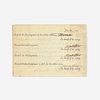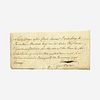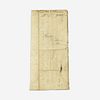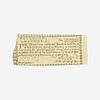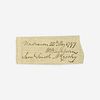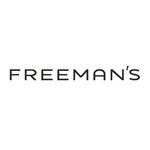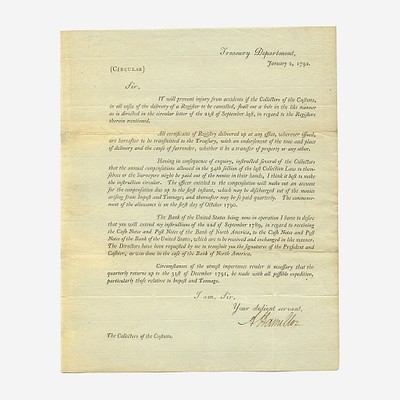[Hamilton, Alexander] [Society for Establishing Useful Manufactures] Group of 3 Documents Relating the Society for Establishing Useful Manufactures
About Seller
2400 Market St
Philadelphia, PA 19147
United States
Established in 1805, Freeman’s Auction House holds tradition close, with a progressive mind-set towards marketing and promotion, along with access to a team of top experts in the auction business. And now with offices in New England, the Southeast, and on the West Coast, it has never been easier to ...Read more
Two ways to bid:
- Leave a max absentee bid and the platform will bid on your behalf up to your maximum bid during the live auction.
- Bid live during the auction and your bids will be submitted real-time to the auctioneer.
Bid Increments
| Price | Bid Increment |
|---|---|
| $0 | $25 |
| $500 | $50 |
| $1,000 | $100 |
| $2,000 | $200 |
| $3,000 | $250 |
| $5,000 | $500 |
| $10,000 | $1,000 |
| $20,000 | $2,000 |
| $30,000 | $2,500 |
| $50,000 | $5,000 |
| $100,000 | $10,000 |
About Auction
Oct 25, 2021
Freeman's is honored to present The Alexander Hamilton Collection of John E. Herzog, a single-owner sale of Alexander Hamilton material, on October 25. Curated by Darren Winston, Head of the Books and Manuscripts Department. Freeman's info@freemansauction.com
- Lot Description
[Hamilton, Alexander] [Society for Establishing Useful Manufactures] Group of 3 Documents Relating the Society for Establishing Useful Manufactures
Printed Subscription, signed
New-York: Hugh Gaine, January 13, 1792. One sheet folded to make four pages, 5 1/4 x 7 3/4 in. (133 x 197mm). Partially-printed subscription for the "Society for Establishing Useful Manufactures," in the state of New Jersey (No. 5328), issued to Cornelius Ray (b. 1755; second president of the New York Branch of the Bank of the United States), for which "on the payment of the several installments...he or his assigns, will be entitled to One Share in the stock of said society"; signed by William Duer (1743-99), as governor; counter-signed by Elisha Boudinot (1749-1819), as Secretary pro Temp; further signed on the second page by board members Benjamin Walker (1753–1818) and Nicholas Low (1739-1826), recording four payments received from Ray. Very lightly worn. A fine example.Together with:
Manuscript Promissory Note
New York, January 20, 1795. One sheet, 3 3/4 x 8 in. (95 x 203mm). Manuscript promissory note, signed by Nicholas Low, as governor of the Society for Establishing Useful Manufactures, to Jonathan Burrall Esq., cashier of the New York Office of Discount and Deposit of the Bank of the United States, for $15,000; docketed on verso by Low. Creasing from original folds; left and bottom edges slightly worn.Printed Paterson Lottery Ticket
(Newark, New Jersey): Woods, no date (ca. 1790s). One small sheet, 1 3/4 x 4 1/8 in. (44 x 105mm). Partially-printed Paterson Lottery ticket (No. 527): "This Ticket will entitle the Bearer to such Prize as may be drawn against its Number, in the Lottery of the Society for establishing Useful Manufactures, erected by Virtue of an Act of the Legislature of the State of New-Jersey—subject to a Deduction of 15 per Cent"; signed at bottom by Jonathan Rhea (1754–1815), manager of the lottery scheme; further inscribed on verso: "Undrawn 20th May 1797/W. Blackburn/Sam Smith McCrosky." A fine example of a lottery ticket used by the Society to help secure funds for its endeavor. The Society sold 38,000 tickets at $7 apiece, awarding 14,000 prizes. Ultimately this plan failed, as prohibitive laws in various states in which these tickets were to be sold made the endeavor risky. New plans were devised, and a lottery eventually took place, but it is doubtful whether expenses were covered or a profit was made.A fine group of three documents relating to the Society for Establishing Useful Manufactures. Devised by Alexander Hamilton and Assistant Secretary of the Treasury Tench Coxe, the Society was established to promote industrial development along the Passaic River in New Jersey in an effort to gain independence from British industrial power. Using ideas first formulated in his famous Report on Manufactures (see lot 17), Hamilton, alongside Coxe, formed a public-private partnership to develop a model manufacturing town to compete with industrial centers in England. Present-day Paterson, New Jersey was chosen as the site of this endeavor due to its proximity to the Great Falls of Passaic, a 70-foot tall waterfall, that could help power the mills and factories outlined in the Society's plans. In 1791 the New Jersey legislature passed a resolution granting the society exclusive rights to the land as well as crucial tax abatements. The town was named after then-current Governor of New Jersey, James Paterson, who signed the charter.
Hamilton and the board of directors quickly set to work and raised over $500,000 in startup capital to realize their plans, a huge sum for the time. They hired Charles L'Efant, who would go on to design the future capital in Washington, D.C., as the town planner, designing raceways, aqueducts, and more. His grand vision eventually became too costly, and before he even began he was fired and replaced by William Colt, of gun manufacturing fame. The Society's plans were severely hampered, and their image tarnished, by the Panic of 1792 and the corrupt dealings of the Society's governor, William Duer (signer of the subscription above). In 1792, Duer, along with financier Alexander Macomb were attempting to corner the market in government bonds and take over the Bank of New York. In the process Duer secretly embezzled Society funds earmarked for machinery and workers to feed his speculative mania. When Society comptroller, and future second Secretary of the Treasury, Oliver Wolcott, Jr. noticed the missing money amounting to $292,000 in March of 1792, he demanded Duer repay, and eventually filed a lawsuit against him. The debt overextended Duer who was unable to pay and it eventually landed him in jail. When the Panic unfolded over the next month many directors of the Society who had given money to Duer found themselves bankrupt. With little funds remaining, lacking government support, and a dearth of skilled workers, the Society crawled along for a few more years, but eventually folded by the end of 1796.
- Shipping Info
-
No lot may be removed from Freeman’s premises until the buyer has paid in full the purchase price therefor including Buyer’s Premium or has satisfied such terms that Freeman’s, in its sole discretion, shall require. Subject to the foregoing, all Property shall be paid for and removed by the buyer at his/ her expense within ten (10) days of sale and, if not so removed, may be sold by Freeman’s, or sent by Freeman’s to a third-party storage facility, at the sole risk and charge of the buyer(s), and Freeman’s may prohibit the buyer from participating, directly or indirectly, as a bidder or buyer in any future sale or sales. In addition to other remedies available to Freeman’s by law, Freeman’s reserves the right to impose a late charge of 1.5% per month of the total purchase price on any balance remaining ten (10) days after the day of sale. If Property is not removed by the buyer within ten (10) days, a handling charge of 2% of the total purchase price per month from the tenth day after the sale until removal by the buyer shall be payable to Freeman’s by the buyer. Freeman’s will not be responsible for any loss, damage, theft, or otherwise responsible for any goods left in Freeman’s possession after ten (10) days. If the foregoing conditions or any applicable provisions of law are not complied with, in addition to other remedies available to Freeman’s and the Consignor (including without limitation the right to hold the buyer(s) liable for the bid price) Freeman’s, at its option, may either cancel the sale, retaining as liquidated damages all payments made by the buyer(s), or resell the property. In such event, the buyer(s) shall remain liable for any deficiency in the original purchase price and will also be responsible for all costs, including warehousing, the expense of the ultimate sale, and Freeman’s commission at its regular rates together with all related and incidental charges, including legal fees. Payment is a precondition to removal. Payment shall be by cash, certified check or similar bank draft, or any other method approved by Freeman’s. Checks will not be deemed to constitute payment until cleared. Any exceptions must be made upon Freeman’s written approval of credit prior to sale. In addition, a defaulting buyer will be deemed to have granted and assigned to Freeman’s, a continuing security interest of first priority in any property or money of, or owing to such buyer in Freeman’ possession, and Freeman’s may retain and apply such property or money as collateral security for the obligations due to Freeman’s. Freeman’s shall have all of the rights accorded a secured party under the Pennsylvania Uniform Commercial Code.
-
- Buyer's Premium



 EUR
EUR CAD
CAD AUD
AUD GBP
GBP MXN
MXN HKD
HKD CNY
CNY MYR
MYR SEK
SEK SGD
SGD CHF
CHF THB
THB![[Hamilton, Alexander] [Society for Establishing Useful Manufactures] Group of 3 Documents Relating the Society for Establishing Useful Manufactures](https://s1.img.bidsquare.com/item/l/9470/9470943.jpeg?t=1MwoER)
![[Hamilton, Alexander] [Society for Establishing Useful Manufactures] Group of 3 Documents Relating the Society for Establishing Useful Manufactures](https://s1.img.bidsquare.com/item/s/9470/9470943.jpeg?t=1MwoER)
